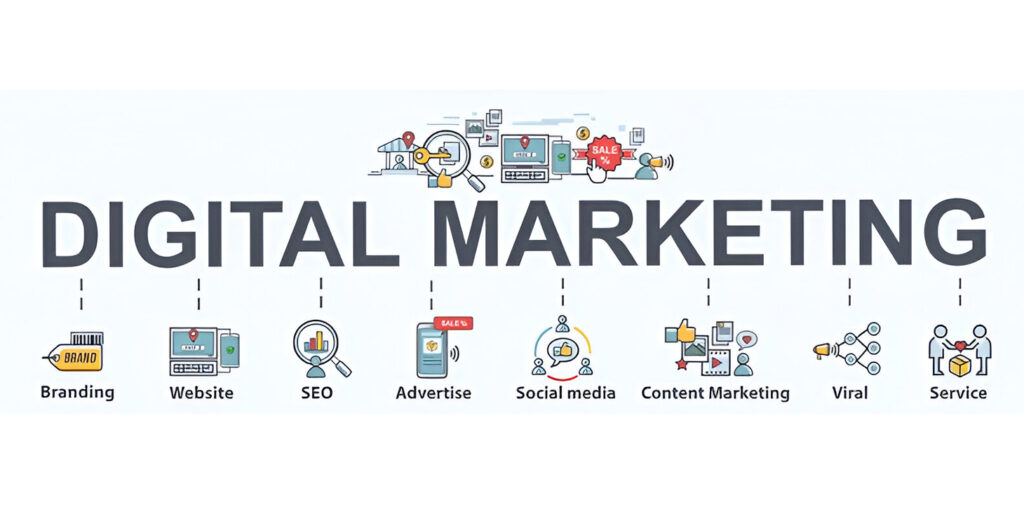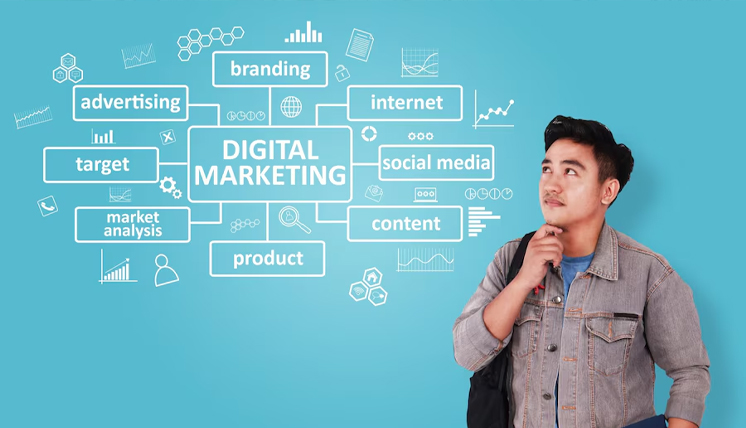Top 7 Point What is Digital Marketing 2024

Digital marketing is a dynamic way of interacting and connecting with digital audiences through multiple state-of-the-art internet channels. It comprises a wide range of tactics for efficiently marketing products, services, and online brands. Businesses can communicate with their target clients in a targeted and engaging way via channels including search engines, social media, email, and mobile apps.
The use of technology promotes this engagement, allowing businesses to adjust their strategies to individual interests. In today’s ever-changing marketplace, knowing the complexities of digital marketing is important for organizations aiming to remain competitive and attain long-term relevance in the marketplace.
What is Digital Marketing?
Digital marketing is similar to traditional marketing but takes place entirely online. Instead of advertisements in newspapers or leaflets in your mailbox, you see them while scrolling through social media, searching Google, or watching YouTube videos.

This is how it works. Companies contact their target audience using a variety of digital channels, including websites, social media platforms, email, and search engines. They generate interesting material, such as posts, videos, or advertisements, that is suited to specific platforms and audiences.
The goal is to capture your attention and convince you to purchase their products or services. They may employ tactics like search engine optimization (SEO) to ensure that their website appears at the top of search results or social media marketing to engage with customers and foster brand loyalty. If you want to read more about graphic design tools, visit the link.
Digital marketing is more than just selling products; it is also about developing relationships with customers. Companies utilize analytics software to track your online behavior and preferences, allowing them to tailor their marketing campaigns and improve the user experience.
How to do Digital Marketing?
Digital marketing entails promoting items or services via online channels such as social media, search engines, email, and websites. Strategies include developing compelling content, optimizing for search engines, launching paid advertising campaigns, and using data to fine-tune methods. It’s all about effectively reaching out to and interacting with your target audience online.


Define specific goals and objectives
Specific goals and objectives in digital marketing are specific, measurable aims that firms strive to attain through their online activities. These could include increasing website traffic, increasing sales conversions, gaining social media followers, improving search engine rankings, raising brand exposure, or creating more prospects. Setting precise goals allows firms to better focus their initiatives and track their progress toward reaching targeted digital outcomes.
Building Your Online Presence
Building an online presence in digital marketing entails creating a strong internet presence for your brand. To effectively reach and connect with potential customers, you should create a professional website, engage on social media platforms, manage online reviews, and optimize content for search engines.
Influencer Marketing
Influencer marketing is a dynamic digital marketing technique in which firms work with individuals with large online followings, known as influencers, to promote their products or services. These influencers use their authority, authenticity, and rapport with their audience to promote companies across several digital channels, including social media, blogs, and YouTube.
The Difference Between Contact and Digital Marketing
Contact marketing entails directly reaching out to potential clients via means such as cold calling or direct mail. It is more personal and obtrusive.
Digital marketing, on the other hand, uses internet channels like social media, email, and search engines to attract, engage, and convert prospects. It has a greater reach, employing digital platforms and technologies to target specific demographics and track campaign results more efficiently.

Overview of Contact Marketing
Contact marketing is a strategic approach that focuses on individualized, focused engagement with prospective clients. It entails reaching out to individuals or businesses via multiple channels, such as email, social media, phone calls, or direct mail, with personalized messages and offers. Contact marketing strives to engage prospects and convert them into loyal customers by promoting relationship-building and value creation.
Comparison of Contact and Digital Marketing
Contact marketing is the practice of communicating directly with clients via phone, email, or direct mail in order to build human ties. Digital marketing, on the other hand, uses online channels such as social media, email, and websites to reach and engage target audiences. While contact marketing is more personalized, digital marketing has more reach and scalability via automation and analytics.
Future Trends and Predictions
Future marketing trends may emphasize hyper-personalization, utilizing AI and big data for customized communications. As the number of voice-activated devices grows, voice search optimization will become increasingly important. Augmented reality (AR) and virtual reality (VR) will improve customers’ experiences. Sustainability and ethical practices will have a greater influence on customer decisions, resulting in an increase in eco-friendly marketing methods. Video content will take precedence, with short-form and interactive formats gaining appeal.
How to Create a Digital Marketing Strategy
To develop a digital marketing plan, define your goals, target audience, and budget. Conduct market research to better understand rivals and audience preferences. Create a content plan that is consistent with your brand voice and SEO keywords. Reach your audience through a variety of digital channels, including social media, email, and SEO. Use analytics tools to monitor performance and make data-driven decisions. To maintain efficacy and ROI, continuously optimize your plan based on insights and shifting industry trends.

Define your goal objects
In digital marketing, goal objects refer to a variety of outcomes that are intended to achieve company objectives. These may include raising brand exposure, driving website traffic, generating leads, increasing sales and conversions, improving customer engagement and loyalty, strengthening online reputation, and finally maximizing return on investment (ROI). Each goal object acts as a measurable target for marketing strategies and techniques, allowing for more effective resource allocation and the achievement of desired outcomes.
Know Your Audience
Understanding your target audience is vital in digital marketing. Analyze demographics, hobbies, and internet behavior to develop tailored ads. Use data from website analytics, social media insights, and market research to successfully adjust content and messaging. Knowing your audience improves engagement and conversion rates, resulting in total marketing success.
Audit Your Current Digital Presence
Auditing your current digital presence entails assessing your website, social media profiles, and other digital assets. Identify your skills, flaws, and places for progress. Assess branding consistency, content quality, user experience, and engagement metrics to improve your digital presence’s performance and alignment with marketing goals.
Importance of Digital Marketing
In the 21st century, businesses are dependent on digital marketing to reach and engage their target audience. It provides a low-cost way to promote items or services, broaden market reach, and increase revenue. Digital marketing, which uses multiple internet channels such as social media, email, and search engines, allows for accurate targeting, real-time statistics, and individualized communication, ultimately leading to higher brand visibility, consumer engagement, and revenue development.


Targeted Advertising
Targeted advertising sends promotional messages to specific audience segments based on their demographics, interests, or online behavior. If you want to read more improve for English writing skills, visit the link. Advertisers may use data analytics to boost relevance and engagement, optimize ad spend, and improve return. This personalized method improves efficacy by sending targeted messages to the most relevant audiences, resulting in improved outcomes.
Engagement and Interaction
Engagement and interaction are critical in digital marketing because they foster connections with audiences through meaningful interactions. Businesses can earn the trust, loyalty, and brand advocacy of their target audience by encouraging interaction, responding fast, and providing useful information.
Brand Visibility and Awareness
Brand exposure and awareness are key components of digital marketing, ensuring that your target audience can quickly recognize and recall your brand. Businesses may enhance brand visibility and recognition by strategically employing numerous online channels and strategies, such as SEO, social media, and content marketing, which will eventually drive client acquisition and loyalty.
Popular Digital Marketing Tools
Popular digital marketing tools include a wide range of platforms and software aimed at streamlining and improving online marketing activities. Google Analytics provides comprehensive information on website traffic and user behavior. Hootsuite simplifies social media administration by allowing users to schedule posts across numerous networks.
Mailchimp enables email marketing campaigns by providing configurable templates and data. SEMrush helps with search engine optimization (SEO) by researching keywords and analyzing competitors. Buffer offers scheduling and analytics for social media posts. Canva provides simple design tools for producing captivating visual content. These technologies, among others, enable marketers to optimize their plans and reach their target audiences more successfully in the digital arena.

Analytics and Insights
Tools such as Google Analytics and SEMrush provide vital data and insights into website traffic, user activity, and competitor analysis, allowing marketers to make more educated decisions.
Email Marketing
Popular digital marketing tools for content creation include Canva for graphic design, Adobe Creative Cloud for professional-grade design and editing, Grammarly for proofreading and grammar checking, CoSchedule for content planning and organization, and BuzzSumo for content discovery and analysis to identify trending topics and optimize content strategy.
Search Engine Optimization (SEO)
Search Engine Optimization (SEO) tools such as SEMrush and Moz aid with keyword research, site audits, and competitor analysis, allowing businesses to boost their search engine rankings and visibility.
Content Creation
Canva and Adobe Spark offer simple design tools for creating visually appealing content, which is critical for capturing and engaging audiences across digital channels.
Ethical and Sustainable Digital Marketing Practices
In today’s digital landscape, ethical and sustainable digital marketing techniques are becoming more important. As organizations negotiate the complex world of online marketing, they must prioritize ethics and accountability. Ethical digital marketing entails open communication, respect for user privacy, and an accurate description of products or services.
Furthermore, sustainability in digital marketing includes reducing environmental impact, promoting social responsibility, and encouraging long-term value development. This introduction lays the groundwork for investigating how firms may use digital marketing tactics to generate growth while maintaining ethical standards and contributing to a sustainable future for both consumers and the earth.

The importance of ethical marketing in the digital age
In modern times, ethical marketing is critical for building consumer trust, protecting brand reputation, and ensuring long-term success. Unethical practices may face public criticism and legal consequences as transparency and scrutiny rise. Businesses that prioritize honesty, integrity, and respect for consumer privacy can develop deeper relationships with their target audience and differentiate themselves in a competitive environment.
Using effective marketing methods for long-term success
Effective marketing tactics are critical for long-term success in today’s competitive environment. Businesses may establish brand loyalty and sustain growth by using techniques that resonate with their target consumers, such as personalized content, data-driven insights, and omni-channel approaches. Furthermore, investing in continual marketing review and modification ensures relevance and response to changing customer preferences, which fosters market resilience and durability.
Conclusion
Finally, digital marketing is an essential component of modern corporate strategy, constantly evolving to suit the changing landscape of customer behavior and technological breakthroughs. Its multidimensional strategy, which includes social media, SEO, content marketing, and more, enables organizations to engage with their audiences on a more personalized level than ever before. Companies can improve their marketing efforts and achieve concrete results by leveraging data analytics and cutting-edge technology. As the digital landscape evolves, embracing agility and inventiveness will be critical to staying ahead. Finally, digital marketing’s capacity to establish meaningful connections, increase brand awareness, and generate leads solidifies its status as a must-have tool for organizations navigating the challenges of the digital age.


